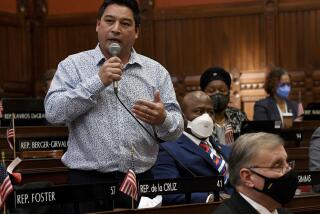Lawmakers and Judges Underpaid, Panel Finds : Persons Best Qualified Leave Careers in Public Service to Those of ‘Average Capabilities,’ It Says
- Share via
WASHINGTON — Congressmen, judges and other key public servants are so “critically underpaid” that many of the citizens best qualified for those positions will not even consider careers in government, a federal salary commission has concluded in a report to be issued today.
Warning that “we cannot afford to be led by persons of average capabilities,” the advisory Commission on Executive, Legislative and Judicial Salaries declared: “We are drifting toward a government led by the wealthy and by those with no current family obligations.”
Moreover, it continued, “if candidates for high public office are to be drawn from such a narrow base, the quality of our government leadership will be seriously impaired.”
The panel, appointed by the President, congressional leaders and the chief justice of the U.S. Supreme Court, reports every four years on the wages of the nation’s 3,147 highest public servants.
The 1984-85 report, entitled “The Quiet Crisis,” was submitted earlier to President Reagan by the commission. The Times also obtained a copy.
$68,400 Is Lowest Salary
Lowest paid among the men and women considered by the study are U.S. magistrates and bankruptcy judges, who earn $68,400 annually. From there, salaries rise to $75,100 for members of Congress, $80,400 for appellate judges, $97,900 for the vice president and $104,700 for the chief justice. The $200,000 salary of the President was not part of the study.
In some cases, the commission found, public officeholders had lost more than one-third of their purchasing power over the last 16 years. It blamed the current system of setting high-level federal salaries--in which wage levels for the executive and judicial branches are tied to Congress’ own pay increases--and recommended that the nation return to a system that “puts space between members of Congress” and a public restless over federal pay.
“To most Americans, the wages paid congressmen, judges and high federal executives seem very substantial indeed,” the report said. “The average wage earner makes a great deal less. We must recognize, however, that if we want the best people in government, we must pay them satisfactory wages. We cannot afford to be led by persons of average capabilities.”
Members of Congress and department heads in the executive branch, such as the directors of the CIA and Office of Management and Budget, have lost 39% of their buying power since 1969, the study found. Federal district judges, meanwhile, have lost 32%.
Commissioners made no recommendations of how high the salaries should be raised, saying that that would be futile until the system for setting wages is changed.
The report recommended a multistep procedure in which future commissions would recommend pay raises to the President, who could alter them at will. Those raises would take effect unless Congress objected by passing a disapproving law within 30 days.
That is a variant of a largely unsuccessful executive salary-setting system instituted in 1968 that succumbed to congressional wariness and a 1983 ruling by the Supreme Court against the “legislative veto” process.
The report also repeated statements made at public hearings on the sensitive issue of salaries, liberally quoting congressmen and judges who feel underpaid.
“The weakest player on the Chicago Bulls basketball team, who spends most of his time on the bench, is paid substantially more than the person who makes the country’s laws,” Sen. Paul Simon (D-Ill.) said. “The result, sometimes, is good basketball players and weak legislators.”
However, the report did not mention some of the perquisites of high-level federal service, such as honorariums totaling as much as $22,530 earned by members of Congress, or the entree successful federal policy-makers sometimes have into high-paying private-sector jobs. A commission staff official said that those factors were considered “in general.”
Also not mentioned by the commissioners was the 5% salary reduction President Reagan proposed earlier this year for the federal civilian work force. In a compromise with Congress, Reagan settled for a pay freeze for those employees. Changes in purchasing power:1969 to 1984 Percent increase Major League baseball players: 466% Corporate executives: 68% Military pay: 19% Senior Attorneys in private industry: 6% Percent decrease Average general federal worker (salaried): -4% Avg. hourly employee (pvt. industry): -9% District Court judges: -32% Members of Congress and independent agency heads: -39% Source: Commission on Executive, Legislative and Judicial Salaries
More to Read
Sign up for Essential California
The most important California stories and recommendations in your inbox every morning.
You may occasionally receive promotional content from the Los Angeles Times.













